Boiler Installation Earby
Find Boiler Replacement in Earby
Receive 3 FREE New Boiler quotes for your project today! Compare profiles, reviews, accreditations, portfolio, etc... and choose the best service.
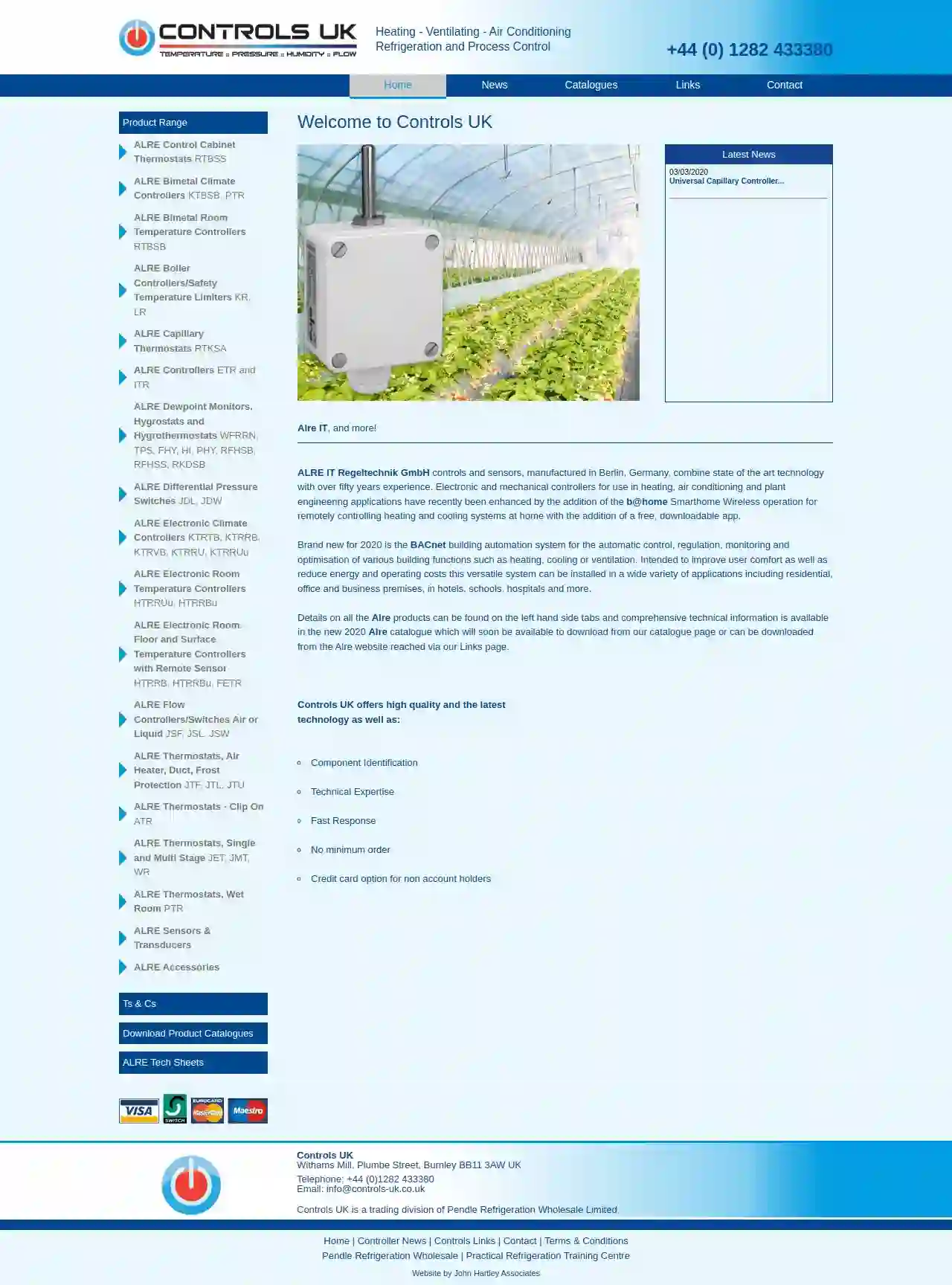
Controls (UK) Ltd
Withams Mill, Plumbe Street, Burnley, BB11 3AW, GBWelcome to Controls UK, a trading division of Pendle Refrigeration Wholesale Limited. We offer high quality and the latest technology in heating, air conditioning and plant engineering applications. Our products include ALRE Control Cabinet Thermostats, RTBSS, ALRE Bimetal Climate Controllers, KTBSB, PTR, and more. We also provide technical expertise, fast response, no minimum order, and credit card option for non-account holders. Our sister company, Pendle Refrigeration Wholesale Ltd, offers Bock compressors and condensers, Frimetal evaporators, Carly refrigeration parts, Yellow Jacket and other service tools, plus a full range of spares and consumables, refrigerants and oils. Our website is designed and hosted by John Hartley Associates Limited.
- Services
- Why Us?
- Accreditations
- Gallery
Get Quote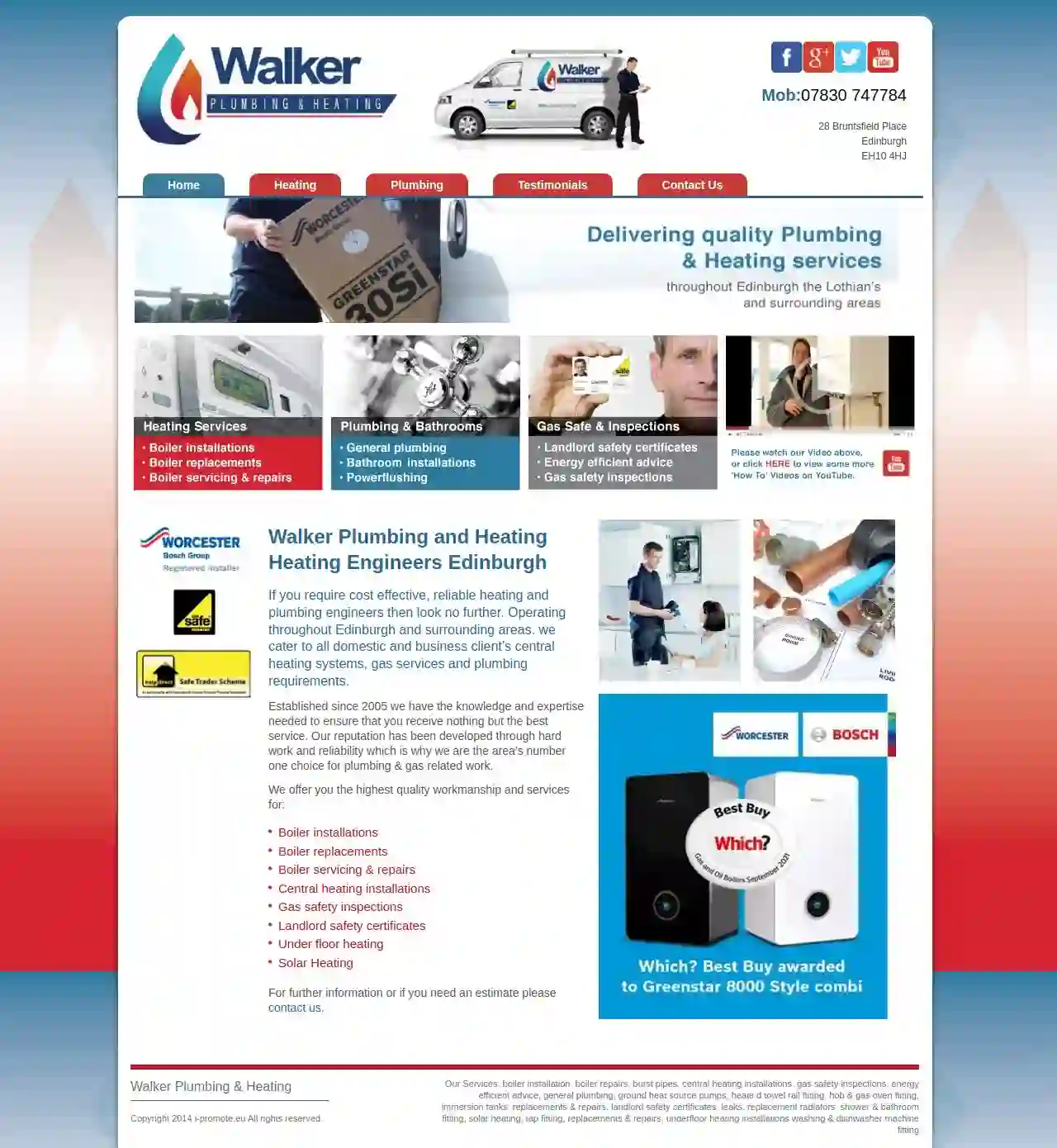
Walker Plumbing & Heating
Bruntsfield Place, Edinburgh, EH10 4HJ, GBWalker Plumbing and Heating is a reputable and experienced heating and plumbing company operating in Edinburgh and the Lothians. Established since 2005, we have built a strong reputation for providing cost-effective, reliable, and high-quality services. Our team of skilled engineers cater to all domestic and business clients, offering a range of services including boiler installations, boiler repairs, central heating installations, gas safety inspections, and more. We pride ourselves on our hard work, reliability, and commitment to providing the best service possible.
- Services
- Why Us?
- Gallery
Get Quote
D M H Lanc Ltd
51 reviews47 School Lane, Newton, PR4 3RT, GBTrading as DMH (Lancs) Ltd WELCOME TO DREW MYERSCOUGH HEATING. PROFESSIONAL, WORCESTER BOSCH ACCREDITED HEATING ENGINEER CENTRAL HEATING AND BOILER SERVICES THROUGHOUT THE PRESTON AREAS AND THE FYLDE BY DREW MYERSCOUGH HEATING ENGINEER Hello – I’m Drew. I’m a Worcester Bosch accredited and highly experienced, time served (since 1989) central heating and boiler engineer. I’m able to repair, service and install all makes of boiler. With Worcester accreditation I can provide a 10 or 12 year guarantee on Worcester Bosch boilers and controls! I work hard to ensure that all repairs and installations are carried out in a tidy, methodical and safe manner and I treat every central heating repair or boiler installation as a valuable addition to my portfolio of work that I have carried out in Preston and throughout the Fylde Coast. I have built up many references, testimonials and photographs of my heating work over the years. PROFESIONAL Always aiming to offer the very highest of standards throughout all of the work I carry out, which is reflected in my long established and happy customer base. WORCESTER BOSCH ACCREDITED I’m a Worcester Bosch accredited and highly experienced central heating and boiler engineer. TRANSPARENT BILLING Offering a no call out charge service, you will always know exactly what you are paying for and the service you will expect to recieve
- Services
- Why Us?
- Accreditations
- Our Team
- Gallery
Get Quote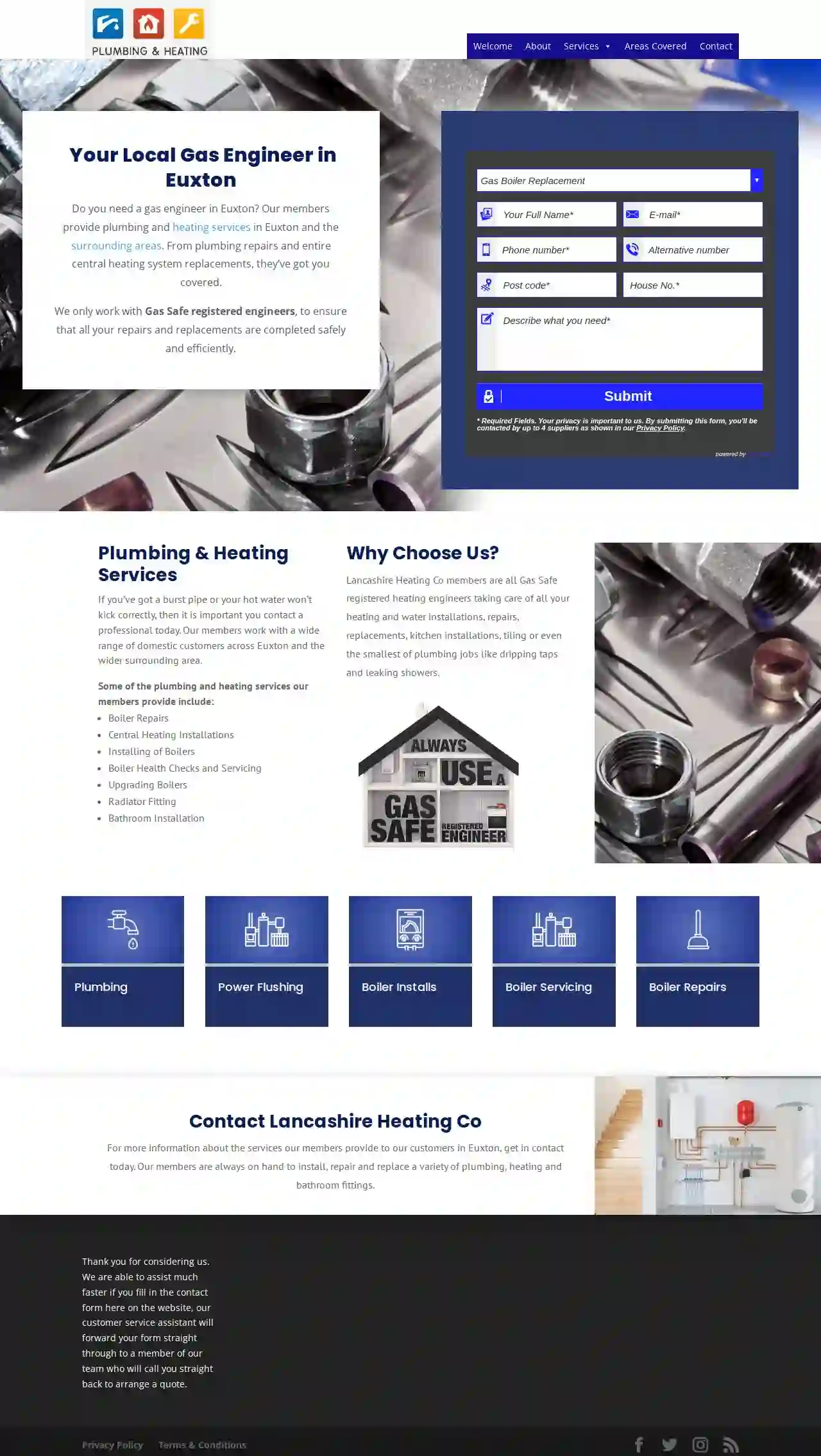
Michael O'Donnell Gas Services
51 reviewsChorley, GBLancashire Heating Co provides plumbing and heating services in Lancashire and the surrounding areas. Our members are Gas Safe registered engineers, ensuring all repairs and replacements are completed safely and efficiently. We offer a range of services, including boiler repairs, central heating installations, boiler health checks and servicing, upgrading boilers, radiator fitting, and bathroom installation. Our team is dedicated to providing excellent customer service and ensuring that all our customers receive the highest level of workmanship and professionalism.
- Services
- Why Us?
- Gallery
Get Quote
S Dewhurst Plumbing, Heating & Fireplaces
4.714 reviews4 Norfolk Avenue, Burnley, BB12 6DG, GBEstablished over 20 years ago, our family owned business is focused on providing a genuine and reliable service to all of our customers. Our fully trained and qualified team offer exceptional service, taking pride in our distinguished reputation. We specialise in the fitting of all fireplaces, gas fire, solid fuel and stoves with vast experience. We are also Gas Safe registered heating engineers and install central heating systems and offer all aspects of general plumbing.
- Services
- Why Us?
- Accreditations
- Our Team
- Testimonials
- Gallery
Get Quote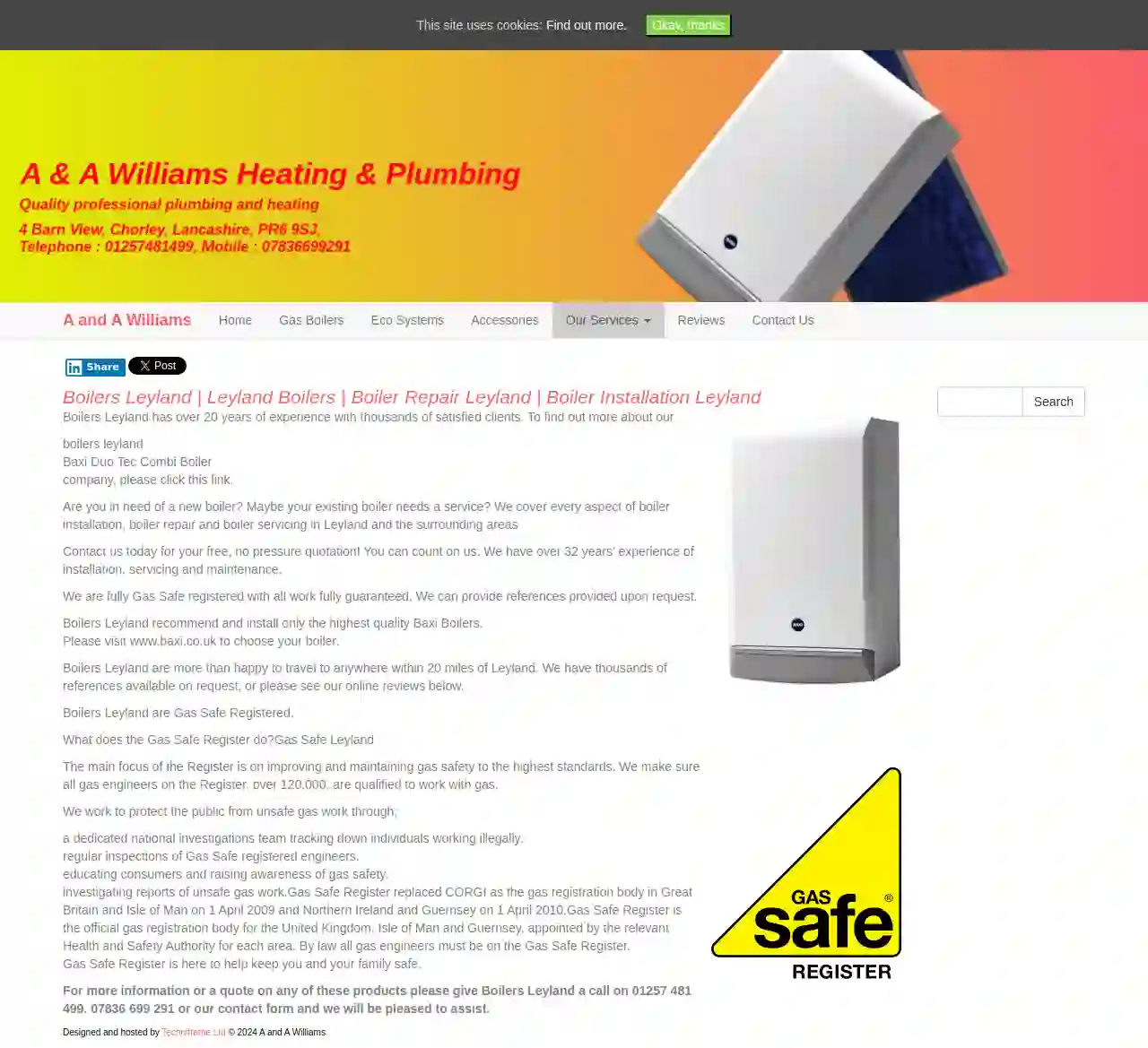
Boilers Leyland
Leyland, PR25, GBBoilers Leyland has over 20 years of experience with thousands of satisfied clients. To find out more about our company, please click this link. We are fully Gas Safe registered with all work fully guaranteed. We can provide references provided upon request. Boilers Leyland recommend and install only the highest quality Baxi Boilers. Please visit www.baxi.co.uk to choose your boiler. Boilers Leyland are more than happy to travel to anywhere within 20 miles of Leyland. We have thousands of references available on request, or please see our online reviews below. Boilers Leyland are Gas Safe Registered. We work to protect the public from unsafe gas work through regular inspections of Gas Safe registered engineers, educating consumers and raising awareness of gas safety, and investigating reports of unsafe gas work.
- Services
- Why Us?
- Accreditations
- Gallery
Get Quote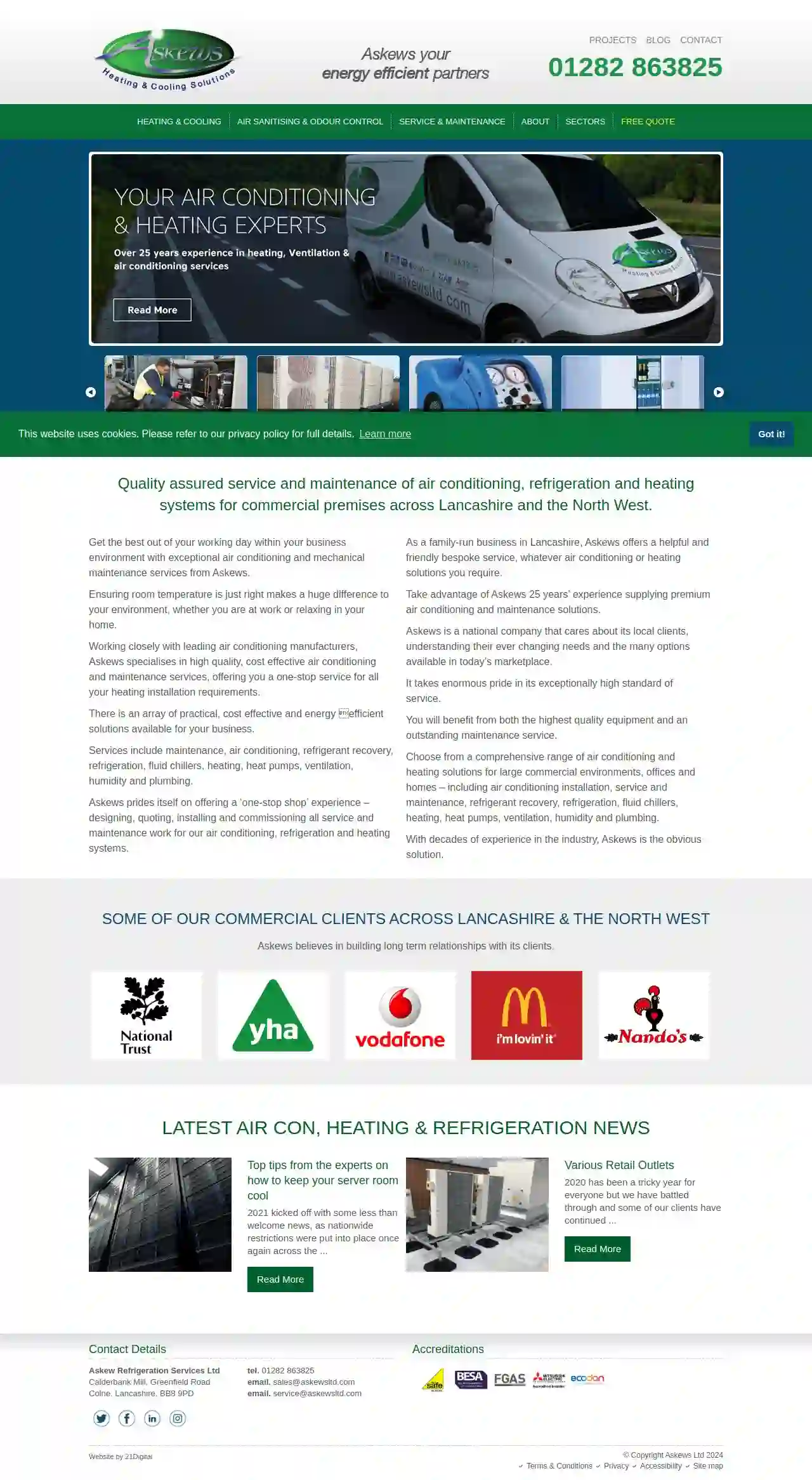
Askew Refrigeration Services
54 reviewsCalderbank Mill, Greenfield Road, Colne, BB8 9PD, GBAskews is a family-run business in Lancashire that offers high-quality, cost-effective air conditioning and maintenance services for commercial premises across Lancashire and the North West. With 25 years of experience, they pride themselves on offering a 'one-stop shop' experience, designing, quoting, installing, and commissioning all service and maintenance work for their air conditioning, refrigeration, and heating systems. They work closely with leading air conditioning manufacturers and offer a range of practical, cost-effective, and energy-efficient solutions for businesses. Their services include maintenance, air conditioning, refrigerant recovery, refrigeration, fluid chillers, heating, heat pumps, ventilation, humidity, and plumbing.
- Services
- Why Us?
- Gallery
Get Quote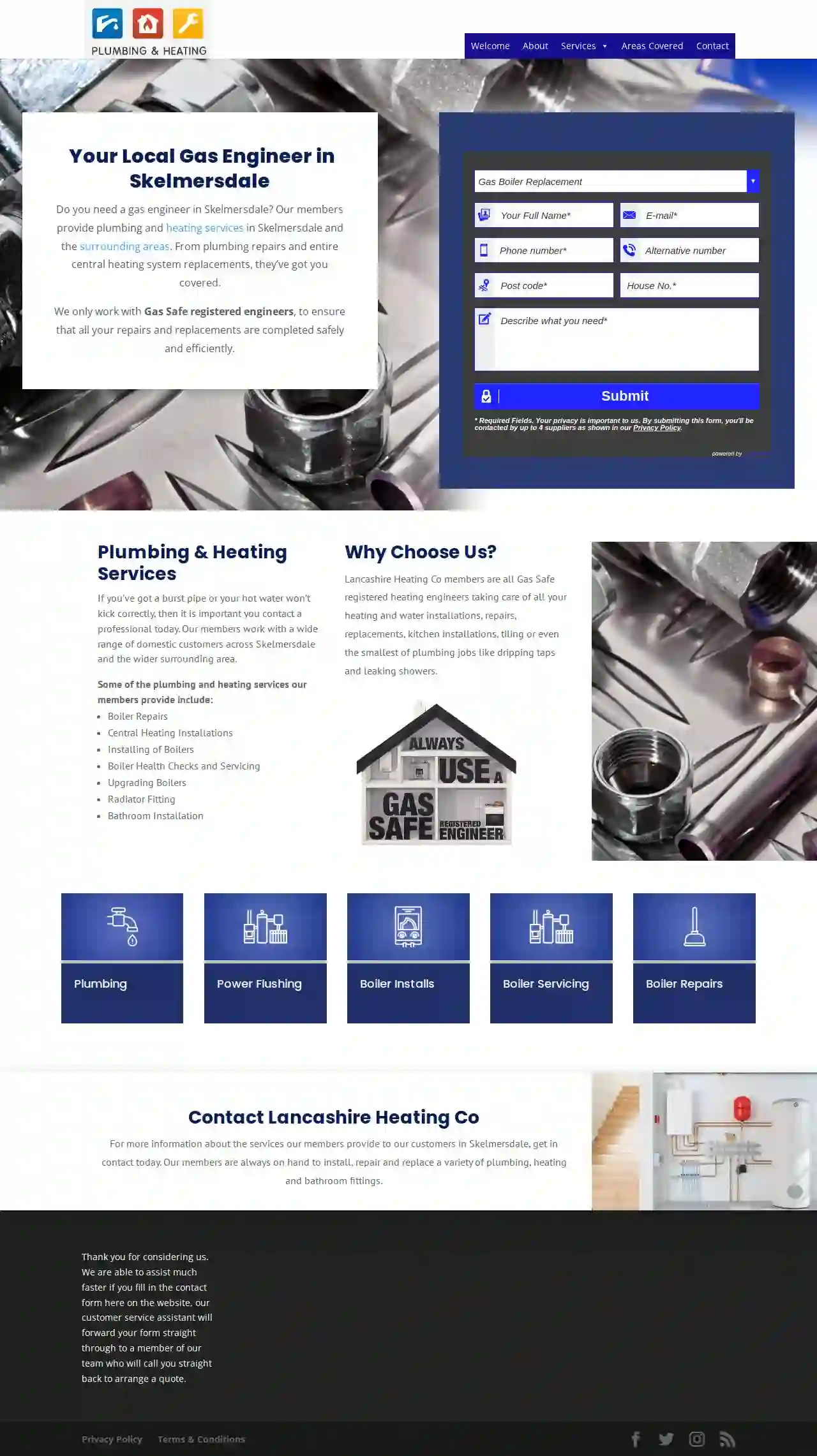
Total H&P Services
Skelmersdale, GBLancashire Heating Co provides plumbing and heating services in Lancashire and the surrounding areas. Our members are Gas Safe registered engineers, ensuring all repairs and replacements are completed safely and efficiently. We offer a range of services, including boiler repairs, central heating installations, boiler health checks and servicing, upgrading boilers, radiator fitting, and bathroom installation. Our team is dedicated to providing excellent customer service and ensuring that all our customers receive the highest level of workmanship and professionalism.
- Services
- Why Us?
- Gallery
Get Quote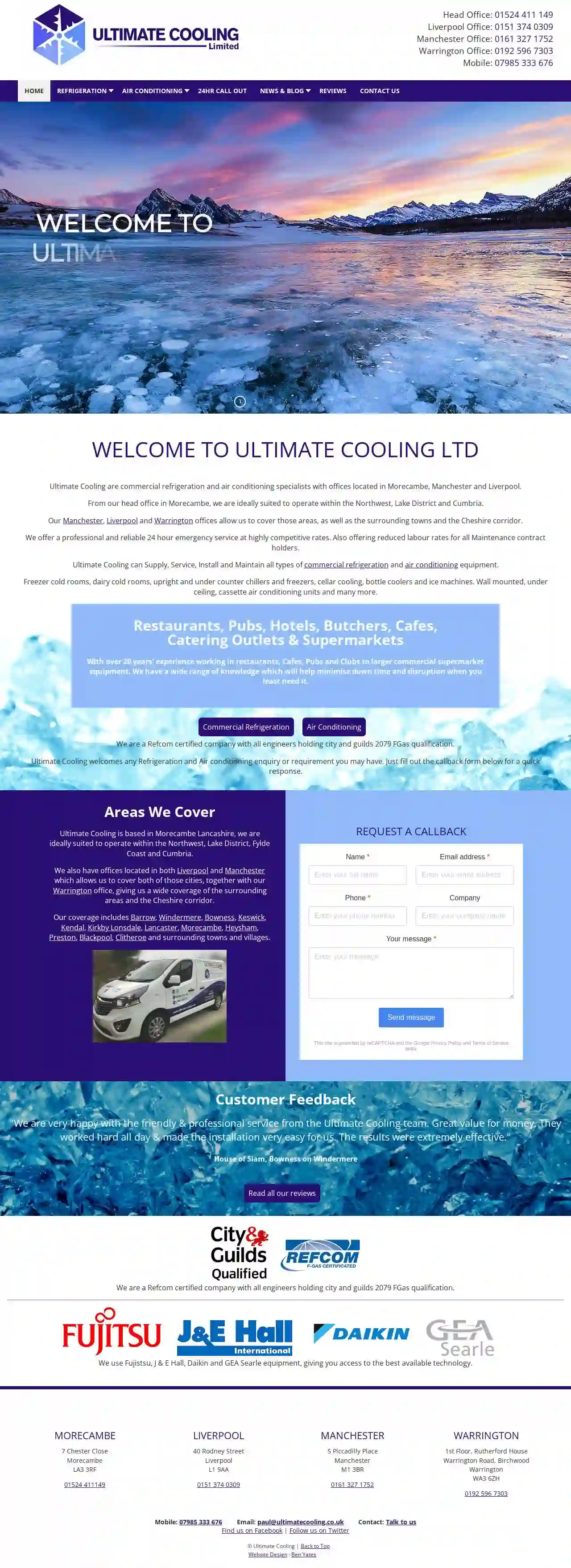
Ultimate Cooling Ltd
53 reviews7 Chester Close, Heaton With Oxcliffe, Morecambe, LA3 3RF, GBUltimate Cooling Ltd is a commercial refrigeration and air conditioning specialist with offices in Morecambe, Manchester, and Liverpool. From their head office in Morecambe, they serve the Northwest, Lake District, and Cumbria. Their Manchester, Liverpool, and Warrington offices allow them to cover those areas and the surrounding towns and the Cheshire corridor. They offer a 24-hour emergency service at competitive rates and reduced labour rates for maintenance contract holders. Ultimate Cooling can supply, service, install, and maintain all types of commercial refrigeration and air conditioning equipment, including freezer cold rooms, dairy cold rooms, upright and under counter chillers and freezers, cellar cooling, bottle coolers, and ice machines. They also work with wall mounted, under ceiling, and cassette air conditioning units. With over 20 years of experience working in restaurants, cafes, pubs, clubs, and larger commercial supermarket equipment, they have a wide range of knowledge to minimize downtime and disruption. Ultimate Cooling is a Refcom certified company with all engineers holding city and guilds 2079 FGas qualification. They use Fujitsu, J & E Hall, Daikin, and GEA Searle equipment, giving you access to the best available technology.
- Services
- Why Us?
- Accreditations
- Our Team
- Testimonials
- Gallery
Get Quote
Christie Heating Services
523 reviewsCenturian Village, Leyland, PR26 7BE, GBWe are a family-owned and operated business, with over 30 years experience working on plumbing and heating systems. We provide gas boiler service, boiler repair and boiler installation services in Leyland and all surrounding areas. We take pride in our work and strive to provide our customers with the best service possible. You can feel confident you have found a company that is reliable, trustworthy and knowledgeable. After working with large corporations for over 10 years, and our own customers for over 20 years, we understand the importance of great customer service and looking after your home. You don't just want a gas engineer, you want integrity and honesty. A boiler service can be an effective way of reducing boiler repair costs. Boilers and central heating systems are often taken for granted by homeowners, who don't realise that lots of breakdowns, leading to an expensive boiler repair, could be prevented by a regular boiler service and preventative maintenance. We work with all the well known brands, such as Worcester, Vaillant, Baxi and Ideal. We will always advise you on the most effective, cost efficient and appropriate actions that will keep your heating system operating as efficiently as possible, and for as long as possible.
- Services
- Why Us?
- Our Team
- Testimonials
- Gallery
Get Quote
Over 12,692+ HVAC Contractors on our directory
Our HVAC contractors operate in Earby & surrounding areas!
HVACCompaniesHub has curated and vetted the Best HVAC Businesses in Earby. Find a top & trustworthy pro today.
Frequently Asked Questions About Boiler Installation
- Carbon Monoxide Detectors: Place CO detectors in strategic locations and test them regularly. . Carbon monoxide (CO) is an odorless, colorless gas that can be produced by a malfunctioning boiler. . Detectors will alert you if there's a CO leak.
- Annual Service: Have your boiler serviced every year by a qualified technician. . This ensures it's working at its best. Regular maintenance ensures optimal performance and protects your investment.
- Check for Leaks: Look for water or other fluids that might indicate a leak. If a leak is detected, seek professional service.
- Know Your System: Understand your boiler's functions and components. Read the manufacturer's instructions for safe operation and maintenance tips. .
- Ventilation: Make sure your boiler has adequate ventilation. Obstructing airflow can lead to dangerous situations.
- Gas Safety (for gas boilers): If you detect a gas leak, immediately turn off the gas supply, open windows for ventilation, and evacuate the building. Contact your gas company from a safe location.
- Age: If your boiler is more than 15 years old, it's likely to be less efficient and more prone to breakdowns. Newer boilers can significantly reduce energy bills.
- Frequent Repairs: Multiple service calls in recent years can be a sign that it is more cost-effective to replace your boiler. .
- Inconsistent Heating: If your boiler struggles to heat your home evenly , it may be time for a new one. .
- Leaks and Drips: Any dripping water around your boiler require immediate professional service.
- Unusual Noises: Strange noises like banging, kettling, or whistling coming from your boiler indicate that it's not operating optimally.
- Increasing Energy Bills: A noticeable rise in your energy bills , even with consistent energy usage habits , could be caused by a decrease in boiler efficiency.
- Yellow Flame: If the flame in your gas boiler is yellow instead of blue, it could indicate incomplete combustion, a sign that your boiler may need professional attention Contact a technician right away.
What safety precautions should I take with a new boiler?
What is a power flush, and do I need one for my new boiler?
How do I repressurize my boiler?
Do I need a new boiler?
What safety precautions should I take with a new boiler?
- Carbon Monoxide Detectors: Place CO detectors in strategic locations and test them regularly. . Carbon monoxide (CO) is a deadly, invisible gas. Detectors will alert you if there's a CO leak.
- Annual Service: Have your boiler serviced every year by a qualified technician. . This ensures it's running safely and efficiently.. A professional service can identify potential issues and prevent breakdowns.
- Check for Leaks: Periodically check for leaks or drips around your boiler and piping. If you find any, contact a qualified heating engineer for repairs..
- Know Your System: Familiarize yourself with the controls and features of your new boiler. . Read the manufacturer's instructions for safe operation and maintenance tips. .
- Ventilation: Make sure your boiler has adequate ventilation. Obstructing airflow can lead to dangerous situations.
- Gas Safety (for gas boilers): Safe practices prevent potentially dangerous situations.
What is a power flush, and do I need one for my new boiler?
How do I repressurize my boiler?
Do I need a new boiler?
- Age: If your boiler is more than 15 years old, you should probably consider replacing it. Newer boilers can significantly reduce energy bills.
- Frequent Repairs: Frequent repairs can be a sign that it is more cost-effective to replace your boiler. .
- Inconsistent Heating: If your boiler takes a long time to heat up the radiators, has inconsistent water temperatures, or creates inconsistent temperatures across your property, it could be failing.
- Leaks and Drips: Any dripping water around your boiler require immediate professional service.
- Unusual Noises: Strange noises like banging, kettling, or whistling coming from your boiler indicate a potential problem that needs investigating. .
- Increasing Energy Bills: A noticeable rise in your energy bills , even with consistent energy usage habits , could be a sign of a less efficient boiler. .
- Yellow Flame: If the flame in your gas boiler is yellow instead of blue, it could indicate incomplete combustion, a sign that your boiler may need to be serviced or replaced. Contact a technician right away.